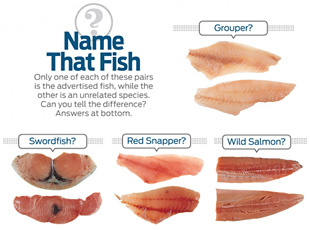Oceana: Traceability Is Key to Fighting Seafood Fraud
Traceability is an important issue for all food, but seafood is of particular concern, as the record keeping and tracking systems in the seafood supply chain have historically lagged behind other food industries like produce and beef.
 Seafood is one of the most popular food choices for Americans, with the United States coming in only behind China as the largest consumer of seafood in the world. What many people don’t know, however, is how complex of a path our seafood travels in the supply chain, with little to no information making it to the final point of sale. This lack of information can cause confusion for consumers, and also increases opportunities for illegal activities like seafood fraud, where seafood is misrepresented in any number of ways, including swapping out one fish for a completely different species. The key to stopping this bait and switch is traceability, or tracking seafood from the fishing boat to your dinner plate.
Seafood is one of the most popular food choices for Americans, with the United States coming in only behind China as the largest consumer of seafood in the world. What many people don’t know, however, is how complex of a path our seafood travels in the supply chain, with little to no information making it to the final point of sale. This lack of information can cause confusion for consumers, and also increases opportunities for illegal activities like seafood fraud, where seafood is misrepresented in any number of ways, including swapping out one fish for a completely different species. The key to stopping this bait and switch is traceability, or tracking seafood from the fishing boat to your dinner plate.
Traceability is an important issue for all food, but seafood is of particular concern, as the recordkeeping and tracking systems in the seafood supply chain have historically lagged behind other food industries like produce and beef. Seafood fraud can happen for a variety of reasons, but most often for financial gain, as it’s been found that commonly swapped species like grouper and wild salmon can cost up to twice as much as their cheaper counterparts. This fraud can happen at any step of the supply chain – from the fishermen, to the processor, or even by the restaurant itself. Seafood fraud undermines consumer and industry sustainability practices and can result in a myriad of health problems. It also hurts honest fishermen and businesses that play by the rules and are undercut by illegally caught and fraudulently labeled fish flooding the U.S. market.
Last year, Oceana released one of the largest seafood fraud studies in the world, which found that 33 percent of more than 1,200 fish samples from across the nation were mislabeled according to Food and Drug Administration guidelines. Tuna and red snapper were among the most mislabeled fish species — at 59 and 87 percent, respectively. In fact, out of 120 samples labeled “red snapper,” only seven were actually true red snapper. “White tuna” was another huge culprit; 84 percent of the samples purchased from sushi bars were found to be escolar, an oily fish that can cause serious digestive problems and carries a health warning from the FDA. In some cities, more than 50 percent of the fish tested were mislabeled.
Furthermore, another recent study found that between 20 percent and 32 percent of seafood imported into the U.S. was likely due to illegal, unreported and unregulated (IUU) fishing. These pirate fishermen often use illegal gear, fish in prohibited areas or catch endangered and threatened species. Illegal fishing is a major threat to the worldwide fishing industry, undermining decades of conservation measures and provoking billions of dollars in economic losses.
A clear solution to these problems exists. Traceability, tracking seafood from boat to plate, would help ensure the fish a diner orders is in fact what the menu says. The federal agencies that work on food, fish and illegal wildlife trade need to come together to devise specific requirements for all seafood sold in the U.S. Much of the information required to implement a seafood traceability scheme is already reported when a fisherman brings their catch to port; the key is having this information follow the fish to the end consumer and creating clear rules at the U.S. border. Requiring the basic who, what, where, when and how of a product being sold, through proper documentation and processes, is a key step to ensure consumer confidence and create clear rules for entry of legal products.
Now more than ever, government officials need to take notice and work to prevent seafood fraud. In June, ocean leaders from around the globe will convene in Washington, D.C. at the Our Ocean conference hosted by Secretary of State John Kerry. This conference will provide a key opportunity for the U.S. to promote ideas that will have huge impacts on global ocean conservation, including seafood traceability. The government should do everything in its power to fight seafood fraud and illegal fishing and ensure that the seafood sold in the U.S. is safe, legally caught and honestly labeled.
Source: triplepundit.com


